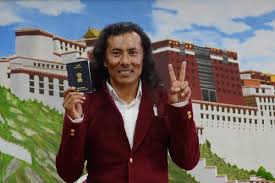LobsangWangyal, the well known local producer of the Miss Tibet pageant and proprietor of the Tibet Sun online news magazine, was recently granted Indian citizenship. This has sparked a rigorous debate among the Tibetan refugee community about whether they should also take the opportunity to become legal Indian citizens.
According to Indian law, people born in India between the years of 1950 and 1987 are citizens of India. However, before the recent court ruling in Wangyal’sfavour Tibetans found it almost impossible to apply for citizenship because they didn’t possess the required citizenship certificate and couldn’t afford the price of going through the necessary legal process. This ruling should make it easier for Tibetans who wish to acquire Indian citizenship to do so.
The day he received his Indian citizenship Wangyal was quoted in the Tibet Sun saying, “legally, I am an Indian through and through but at heart I am still a Tibetan as I still hold my allegiance to the Tibetan movement and to the CTA” [Central Tibetan Admiminstation, the Government-in-Exile].

Lobsang Wangyal
Photo: TibetSun
Lobsang from Students for a Free Tibet understands Wangyal’s decision. “Most Tibetans abroad take the citizenship so why not here in India? After taking the citizenship you can have a platform that wasn’t previously available. You can vote in Indian elections and lobby local politicians to raise the Tibetan issue. You can also carve out a more stable existence for yourself here and then devote more time to the cause of a free Tibet”.
The India Report 2016 from the Tibet Justice Centre alludes to the difficulties faced by Tibetans in settlements due to their status as refugees rather than citizen, stating “Tibetan refugees, as foreigners, are subject to a host of limitations affecting their ability to travel freely, to own property, to qualify for government jobs or seats in educational institutions and to vote in Indian elections”.
Many Tibetans struggle to find gainful employment as refugees and are restricted to sweater selling and agriculture as means to sustain themselves. As a result, the report says,“migration out of the settlements is endemic, particularly among 19 -35 year olds”.
Some prominent members of the Central Tibetan Administration are dismissive of these arguments and critical of Wangyal’s decision.
Dawa Tsering, a CTA official speaking to Contact, said that Tibetans shouldn’t have a choice about citizenship because “taking Indian citizenship will dilute the power and energy of the Tibetan movement. We have to remain as Tibetans to show solidarity with our countrymen who are suffering under Chinese occupation”.
Former Prime Minister Professor SamdhongRimpoche dismissed the suggestion that Tibetans suffered due to their status as refugees in an interview in 2014: “All refugees in India….. I think they have all civil rights, human rights, except the political right to stand for election or vote for election”.
With regards to the difficulties Tibetans faced when acquiring property, Rimpoche remarked controversially, “this issue is just newspeople problem, and in reality, not a single Tibetan refugee has been bothered or dispositioned of any land or property”.
In 2016, Rimpoche said the question of citizenship was “purely a personal choice”, but that those who chose to take citizenship of their host country “might not remain ‘Tibetans’ but would be Tibetan supporters”.




 Print
Print Email
Email